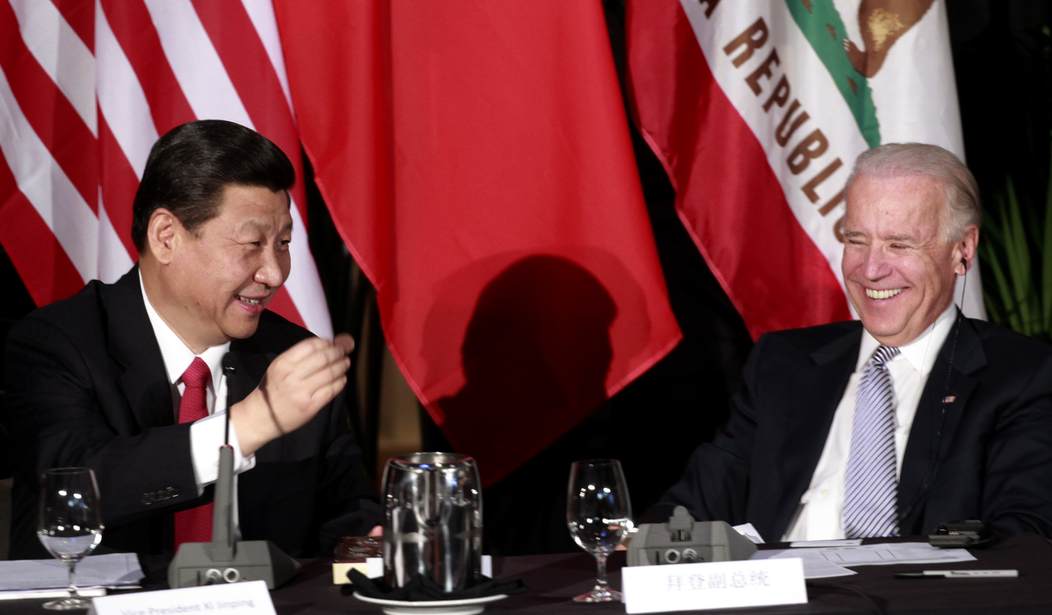I am pretty sure that I have never praised the Biden Administration. I mean, why would I?
Well, I may have found a reason, believe it or not. It seems that the Biden Administration has struck a huge blow against the Chinese tech industry, and it wasn’t even by accident. They did something right, and never let it be said that I am more unfair to liberals than my job naturally requires.
I learned about this from a Twitter thread that I ran across on Friday and wanted to take some time to digest the information, both in the thread and by doing some actual, bonafide research to ensure at least a minimum level of accuracy and coherence.
THREAD: The US government's new export controls are wreaking havoc on China's chip industry.
New rules around "US persons" are driving an "industry-wide decapitation."
— Jordan Schneider (@jordanschnyc) October 14, 2022
So here we go, and yes, it is painful to praise Biden, even a little bit. Worse, I have to rely on The New York Times for part of the story, completing my humiliation:

WASHINGTON — In conversations with American executives this spring, top officials in the Biden administration revealed an aggressive plan to counter the Chinese military’s rapid technological advances.
China was using supercomputing and artificial intelligence to develop stealth and hypersonic weapons systems, and to try to crack the U.S. government’s most encrypted messaging, according to intelligence reports. For months, administration officials debated what they could do to hobble the country’s progress.
They saw a path: The Biden administration would use U.S. influence over global technology and supply chains to try to choke off China’s access to advanced chips and chip production tools needed to power those abilities. The goal was to keep Chinese entities that contributed to potential threats far behind their competitors in the United States and in allied nations.
The effort, no less than what the Americans carried out against Soviet industries during the Cold War, gained momentum this year as the United States tested powerful economic tools against Russia as punishment for its invasion of Ukraine, and as China broke barriers in technological development. The Russian offensive and Beijing’s military actions also made the possibility of a Chinese invasion of Taiwan seem more real to U.S. officials.
There are two important aspects of the China/Taiwan tension that are both related to technology:
- China has become a technology superpower due to America’s reliance on its manufacturing prowess. Almost everything we think of as high-tech has a lot of Chinese manufacturing and components in the end product. Those DJI drones doing the heavy lifting in Ukraine? Chinese.
- Taiwan is a much more important technology superpower. Almost every high-end microprocessor (the highest up the value chain) is reliant on Taiwan Semiconductor Manufacturing Company (TSMC) is made by TSMC. They blow everybody else away in making chips, including former leader Intel. Over half of the chips in the products you use are manufactured by TSMC.
China doesn’t only want Taiwan territory; if they ran Taiwan they would control many of the most important parts of the tech industry. They aren’t a design or software powerhouse, but the world would still rely on them for high-tech products. As a matter of fact, one of the reasons China remains hesitant to invade Taiwan is the implied strategy of the Taiwanese government to threaten the destruction of TSMC facilities were they to be invaded. This is the so-called “silicon shield.”
China does manufacture chips, but their manufacturing processes are decades behind TSMC and Intel. Most of the intellectual property and expertise they rely on are Western. They may assemble the products we use, but they do so with our expertise. Without it, they lose their status as a tech superpower.
It is in this context that the Biden sanctions against China must be understood. If we strangle China’s access to Western know-how, we cripple the Chinese. (The link is to a study done by the Center for Strategic and International Studies, CSIS.)
And apparently crippling the Chinese is what Biden is doing.
The administration’s concerns about China’s tech ambitions culminated last week in the unveiling of the most stringent controls by the U.S. government on technology exports to the country in decades — an opening salvo that would ripple through global commerce and could frustrate other governments and companies outside China.
In a speech on Wednesday on the administration’s national security strategy, Jake Sullivan, the national security adviser, talked about a “small yard, high fence” for critical technologies.
“Choke points for foundational technologies have to be inside that yard, and the fence has to be high because these competitors should not be able to exploit American and allied technologies to undermine American and allied security,” he said.
This account of how President Biden and his aides decided to wage a new global campaign against China, which contains previously unreported details, is based on interviews with two dozen current and former officials and industry executives. Most spoke on the condition of anonymity to discuss deliberations.
The measures were particularly notable given the Biden administration’s preference for announcing policies in tandem with allies to counter rival powers, as it did with sanctions against Russia.
With China, the administration spent months in discussions with allies, including the Dutch, Japanese, South Korean, Israeli and British governments, and tried to persuade some of them to issue restrictions alongside the United States.
But some of those governments have been hesitant to cut off important commerce with China, one of the world’s largest technology markets. So the Biden administration decided to act alone, without public measures from allies.
The fact that we are going it alone actually doesn’t particularly bother me. While we do not have a stranglehold on vital expertise and IP, we have enough control to make a huge dent in Chinese tech prowess. Unless the goal is to completely cripple China’s economy and declare an economic war–one which the US would win, but at astronomical cost to our economy–the controls Biden has put in place are likely sufficient to achieve our goals in the near- to medium-term.
The US economy is still far too reliant on China–our supply chain is completely intertwined with theirs. A full-on economic war might be excessive and certainly would be very painful, at a time when the US is experiencing entirely too much economic pain already. In this context, it is even surprising that Biden took these steps.
Apparently, Hunter has extricated his own finances from China. There, I took my cheap shot at Biden.
“In weaponizing its dominant choke-point positions in the global semiconductor value chain, the United States is exercising technological and geopolitical power on an incredible scale,” he wrote in an analysis.
The package of restrictions allows the administration to cut off China from certain advanced chips made by American and foreign companies that use U.S. technology.
U.S. officials described the decision to push ahead with export controls as a show of leadership. They said some allies wanted to impose similar measures but feared retaliation from China, so the rules from Washington that encompass foreign companies did the hard work for them.
Maybe, maybe not. In general, our allies tend to be less willing to throw their economic weight around. Their economies are far less diverse than America’s, so harming a domestic company’s profit potential is disproportionately painful compared to the US. And some of those companies are very specialized and have a substantial proportion of their business tied up in providing China manufacturing equipment.
But whether this is American leadership or American bullying, it doesn’t really matter. We are still the big kid on the block and tend to get our way. Ask Canada and Mexico about that. Trump wanted NAFTA renegotiated. NAFTA got renegotiated to our advantage. They need us more than we need them, and that applies to everybody but a few outliers.
Some companies have chafed at the idea of losing sales in a lucrative market. In a call with investors in August, an executive at Tokyo Electron in Japan said the company was “very concerned” that restrictions could prevent its Chinese customers from producing chips. ASML, the Dutch equipment maker, has expressed criticisms.
Chinese officials called the U.S. restrictions a significant step aimed at sabotaging their country’s development. The move could have broad implications — for example, limiting advances in artificial intelligence that propel autonomous driving, video recommendation algorithms and gene sequencing, as well as quashing China’s chip-making industry.
China could respond by punishing foreign companies with operations there. And the way Washington is imposing the rules could strain U.S. alliances, some experts say.
“Sanctions that put the United States at odds with its allies and partners today will both undercut their effectiveness and make it harder to enroll a broad coalition of states in U.S. deterrence efforts,” said Jessica Chen Weiss, a professor of government at Cornell University and a recent State Department official.
Yeah, no. These allies rely on our military shield, and we subsidize their defense to such an extent that their power to compel us is near zero. And with the exception of Afghanistan and to some extent Iraq, our allies haven’t helped us much militarily. They can bitch and occasionally sting us, but not much more.
The new restrictions the Administration has placed on exports to China are not merely symbolic. They are already hurting China:
The Biden administration took action in August to clamp down on China’s semiconductor industry, sending letters to equipment manufacturers and chip makers barring them from selling certain products to China.
Last week, the administration issued the rules with global reach.
Companies immediately began halting shipments to China. But U.S. officials said they would issue licenses on a case-by-case basis so some non-Chinese companies could continue supplying their Chinese facilities with support and components. Intel, TSMC, Samsung and SK Hynix said they had received temporary exemptions to the rules.
The controls could be the beginning of a broad assault by the U.S. government, Mr. Pottinger said.
“The Biden administration understands now that it isn’t enough for America to run faster — we also need to actively hamper the P.R.C.’s ambitions for tech dominance,” he said, referring to the People’s Republic of China. “This marks a serious evolution in the administration’s thinking.”
Let’s take a look at some of the consequences to China, via the Twitter thread I referenced above. It is an English translation of a thread by a Chinese tech entrepreneur.
Every American executive and engineer working in China’s semiconductor manufacturing industry resigned yesterday, paralyzing Chinese manufacturing overnight.
One round of sanctions from Biden did more damage than all four years of performative sanctioning under Trump.
— Jordan Schneider (@jordanschnyc) October 14, 2022
Long story short, every advanced node semiconductor company is currently facing comprehensive supply cut-off, resignations from all American staff, and immediate operations paralysis.
— Jordan Schneider (@jordanschnyc) October 14, 2022
[Translation of the DMs in a screenshot:
Person A: Everyone from Lam Research at Yangtze Memory left today, and on the 12th the AMAT folks will leave as well
— Jordan Schneider (@jordanschnyc) October 14, 2022
Q: Why hasn’t Chinese media reported on this?
A: I don’t know.
— Jordan Schneider (@jordanschnyc) October 14, 2022
Many people don’t understand why this is annihilation.
ASML has stopped providing services and support to mainland China. pic.twitter.com/AvT31p9qvk
— Jordan Schneider (@jordanschnyc) October 14, 2022
To the extent that I can, which is not much, I have verified this. And that means that it is of medium reliability. Certainly, ASML leaving is a big blow, and the extent of the Biden Administration sanctions is dramatic, the thread itself is more than plausible.
I admit to being shocked that the Biden Administration has chosen this path. It is bold, aggressive, and likely to hurt China badly both economically and militarily. I would have to assume that they have war-gamed the consequences extensively because such a move would not be taken either lightly or without serious consideration.
In this case, unlike the Russia sanctions, the Administration had plenty of time to evaluate the costs and benefits. Without access to the information and analysis they have, I can’t say with certainty that this was precisely the right policy, but it certainly moves us in the direction of achieving the goal of slowing China’s ability to threaten our interests in the Pacific.









Join the conversation as a VIP Member